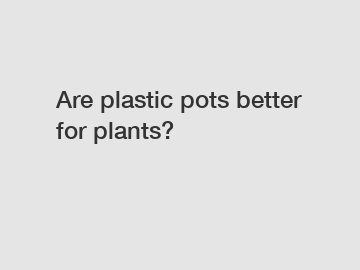Are plastic pots better for plants?
Are plastic pots better for plants?
Plants play a vital role in our environment, providing us with fresh air, food, and a touch of beauty. If you're a plant enthusiast, you might have wondered about the impact that different types of pots can have on their growth and overall health. One common question that arises is whether plastic pots are better for plants compared to other options such as ceramic or terracotta pots. Let's delve into this subject and explore the advantages and disadvantages of plastic pots for our beloved green companions.
Plastic pots have gained popularity over the years due to their affordability and durability. They are readily available in various shapes, sizes, and colors, making them suitable for any indoor or outdoor gardening project. However, it's important to consider certain factors when deciding whether plastic pots are the best choice for your plants.

To begin with, one of the significant advantages of plastic pots is their lightweight nature. Unlike ceramic or terracotta pots, which can be heavy and cumbersome, plastic pots can be easily moved and repositioned without straining your back. This feature makes them ideal for those who like to rearrange their plants frequently or have limited physical strength.
Another positive aspect of plastic pots is that they are less prone to breakage. Unlike their fragile ceramic or terracotta counterparts, plastic pots are more resilient and can withstand accidental drops or rough handling during transportation. This makes plastic pots a favorable option for gardeners who often find themselves in situations that may lead to unintentional pot mishaps.
Furthermore, plastic pots tend to retain moisture more efficiently than porous materials like terracotta or unglazed ceramic. The non-porous nature of plastic prevents water from evaporating as quickly, ensuring that plants receive a steady supply of moisture for their growth. This can be advantageous, especially for individuals with busy schedules or those who may forget to water their plants regularly.
Additionally, plastic pots provide excellent insulation against extreme temperature fluctuations. Unlike clay pots that can crack or shatter due to freezing temperatures, plastic pots remain unaffected by the cold. This insulation capability protects plant roots from potential damage caused by sudden drops in temperature, making plastic pots a reliable choice for outdoor gardening in regions with harsh winter climates.
While these advantages make plastic pots a frequent choice among gardeners, it's essential to consider some downsides that come with their usage. One significant drawback of plastic pots is their limited breathability. The lack of air circulation in the soil can lead to overwatering and the development of root rot, especially if the plant is not provided with proper drainage. To mitigate this issue, it is recommended to drill additional holes in the bottom of plastic pots to ensure adequate water drainage and promote air exchange.
Another concern is the potential leaching of chemicals from plastic pots into the soil. Some types of plastic may release harmful chemicals over time when exposed to sunlight or varying temperatures. To avoid any potential risks, it is advisable to choose pots that are labeled as food-grade or made from recycled plastic. These types of plastic pots are typically less likely to leach harmful substances into the soil, ensuring the well-being of your plants.
Moreover, plastic pots, especially darker-colored ones, have a higher tendency to absorb heat from the sun. This can result in the soil overheating during scorching summer days, causing stress to the plant's roots. To prevent excessive heat absorption, it is advisable to place the plastic pots in shaded areas or use lighter-colored pots that reflect more sunlight.
In conclusion, the choice between plastic pots and other materials for your plants depends on several factors. Plastic pots offer advantages such as their lightweight nature, durability, and moisture retention capabilities. They are particularly beneficial for those who require flexibility in moving their plants and need pots that can withstand accidental impacts. However, their limited breathability and the potential leaching of chemicals are significant aspects to consider. By taking precautions, such as ensuring proper drainage and selecting food-grade or recycled plastic pots, these drawbacks can be mitigated. Ultimately, the decision comes down to personal preference and the specific needs of your plants.
Want more information on plastic plant saucers wholesale, custom planter supplier, plastic plant saucers supplier? Feel free to contact us.


